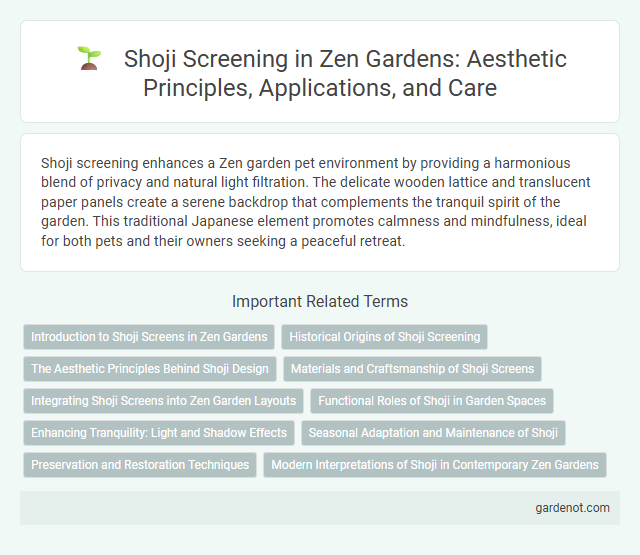Shoji screening enhances a Zen garden pet environment by providing a harmonious blend of privacy and natural light filtration. The delicate wooden lattice and translucent paper panels create a serene backdrop that complements the tranquil spirit of the garden. This traditional Japanese element promotes calmness and mindfulness, ideal for both pets and their owners seeking a peaceful retreat.
Introduction to Shoji Screens in Zen Gardens
Shoji screens are traditional Japanese sliding panels made of translucent paper mounted on a wooden frame, commonly used in Zen gardens to create serene and harmonious spaces. These screens diffuse natural light softly while providing privacy and a subtle connection between indoor and outdoor environments. Incorporating Shoji screens in Zen garden design enhances the minimalist aesthetic and promotes tranquility through balanced light and shadow interplay.
Historical Origins of Shoji Screening
Shoji screening originated in Japan during the Heian period, around the 8th to 12th centuries, serving as functional yet aesthetic room dividers in traditional homes and Zen gardens. Crafted from translucent washi paper stretched over a wooden lattice frame, Shoji screens allowed diffused natural light while maintaining privacy and a connection with nature. Their design reflects Zen principles of simplicity, harmony, and the seamless integration of indoor and outdoor spaces.
The Aesthetic Principles Behind Shoji Design
Shoji screens embody wabi-sabi aesthetics through their minimalist structure and natural materials, emphasizing simplicity and imperfection in Zen gardens. The translucent rice paper diffuses light softly, creating a serene atmosphere that harmonizes with surrounding nature. Their grid-like wooden frames reflect balance and order, promoting mindfulness and tranquility in the meditation space.
Materials and Craftsmanship of Shoji Screens
Shoji screens are traditionally crafted using lightweight wooden frames, typically made from cedar, cypress, or pine, ensuring durability and a natural aesthetic in Zen gardens. The intricate lattice framework supports translucent washi paper, which diffuses light softly while maintaining privacy. Master artisans employ precise joinery techniques without nails or screws, reflecting centuries of refined craftsmanship and enhancing the serene ambiance of the Zen space.
Integrating Shoji Screens into Zen Garden Layouts
Shoji screens seamlessly blend traditional Japanese design with Zen garden aesthetics, creating tranquil partitions that enhance spatial harmony and natural light flow. Incorporating Shoji screens into pathways or seating areas provides subtle privacy without disrupting the minimalist and meditative essence of the garden. Their lightweight, translucent panels promote a fluid connection between indoor and outdoor spaces, reinforcing the Zen principle of simplicity and balance.
Functional Roles of Shoji in Garden Spaces
Shoji screens in Zen gardens serve critical functional roles by providing privacy while maintaining a sense of openness through their translucent paper panels. These lightweight partitions facilitate natural light diffusion, creating a serene ambiance that complements the minimalist aesthetics of the garden. Furthermore, Shoji screens act as subtle windbreaks, enhancing comfort in outdoor spaces without disrupting the visual harmony.
Enhancing Tranquility: Light and Shadow Effects
Shoji screens in Zen gardens create a harmonious interplay of light and shadow, enhancing tranquility by softening natural sunlight and casting delicate patterns. The translucent rice paper diffuses harsh rays, promoting a serene ambiance that encourages mindfulness and relaxation. This subtle illumination fosters a meditative environment, integral to the Zen garden's peaceful aesthetic.
Seasonal Adaptation and Maintenance of Shoji
Shoji screens, crafted from lightweight wooden frames and translucent washi paper, adapt seamlessly to seasonal changes by regulating light and airflow, enhancing the Zen garden's tranquil ambiance. Regular maintenance involves gentle cleaning with a soft brush and prompt repair of any tears to preserve the screen's delicate structure and translucency. Proper upkeep ensures Shoji screening continues to harmonize indoor and outdoor spaces, maintaining the garden's meditative atmosphere year-round.
Preservation and Restoration Techniques
Shoji screening in Zen gardens requires meticulous preservation and restoration techniques to maintain its delicate rice paper and wooden framework. Traditional methods involve careful removal of damaged paper, use of washi paper for seamless replacement, and reinforcing the wooden lattice with natural adhesives to uphold authenticity. Employing climate-controlled environments and regular maintenance prevents deterioration caused by humidity and sunlight exposure.
Modern Interpretations of Shoji in Contemporary Zen Gardens
Modern interpretations of Shoji screening in contemporary Zen gardens emphasize minimalist design and natural materials such as rice paper and bamboo to create serene, light-filtering partitions. These screens integrate traditional Japanese aesthetics with sleek, sustainable elements, enhancing spatial flow and privacy while maintaining an airy ambiance. Incorporating Shoji panels redefines garden spaces by balancing modern architecture with Zen principles of simplicity and harmony.
Shoji screening Infographic

 gardenot.com
gardenot.com